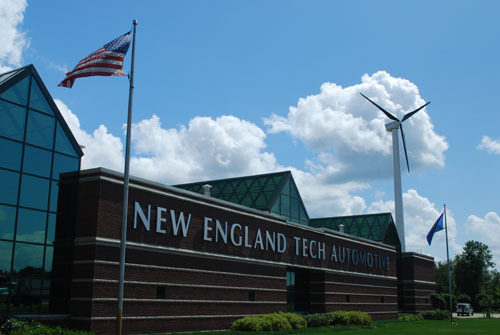
While much attention has been focused on Rhode Island’s quest to build the nation’s first offshore wind farm, the R.I. Economic Development Corporation (EDC) has handed out $416,800 to study placing turbines on solid ground.
Many of those feasibility studies are just now getting under way and EDC Interim Executive Director J. Michael Saul told Providence Business News last week that the grants could form the “mustard seeds” of a new industry.
“We begin to brand ourselves as a state that’s serious about building a green economy,” Saul said.
Earlier this year, the EDC, under the auspices of its Renewable Energy Fund, awarded 11 out of 18 total grants to a mix of cities, partnerships and private companies to study land-based wind turbines. The proposed turbines range from a relatively small 65-kilowatt turbine at Hamilton Elementary School in North Kingstown to placing two 900-kilowatt turbines in Providence. The reports could recommend adjusting the roughed-out ideas or abandoning them all together.
Saul said he hopes the projects prove viable. But he acknowledged that the turbines themselves will have little direct impact on the state’s economy, at least initially. Rhode Island hosts no turbine manufacturers and many installers are located out of state.
But over time, Saul said, the wind turbines could lower electric bills for companies and municipalities that install them. In an ideal world, Saul wants private firms to plow those energy savings into creating jobs. Private companies could also take advantage of Renewable Energy Credits and other tax breaks.
But Saul acknowledged those savings would be small for large companies with multimillion dollar balance sheets. The idea, he said, is less about direct savings and more about building a culture that encourages environmentally sensitive corporations to locate here. And some turbines, like the one at New England Institute of Technology in Warwick, are meant as training tools that could help build the state’s knowledge base.
For cities and towns, the monetary benefits are clearer.
East of Narragansett Bay, a collaborative of nine cities and towns hopes a turbine will lower electric bills. The group persuaded the EDC to hand it $100,000 to study the feasibility of placing turbines in the area. Applying for the grant, officials said, was a no-brainer.
“I think that if we let this opportunity go by … it would be a travesty for us,” Bristol Town Administrator Diane Mederos said. “If we don’t do this now we’re going to be left behind.”
The grant application grew out of meetings hosted by Roger Williams University that identified lowering energy costs and becoming environmentally friendly as shared goals. Bristol took the lead on writing the grant application and also approached the Rhode Island Foundation, which added another $40,000 for the study. Foundation Grant Programs Officer Jenny Pereira said the grant marked the first time the organization contributed toward studying the feasibility of a wind turbine. She said organization officials were intrigued by the potential of nine East Bay towns and Roger Williams University to work together on the project and hoped it would lead to more collaboration.
And if successful, it could spur more grant applications. Pereira said the foundation is already fielding an increasing number of applications for land-based turbine studies, and is handling each on a case-by-case basis.
As for the EDC, Saul said he doesn’t know if studying the feasibility of wind turbines will be an ongoing commitment. It depends, he said, on the market and how the studies turn out.
“If we do our job we will be saying these projects were home runs and these projects are singles that will score a run,” he said. •











